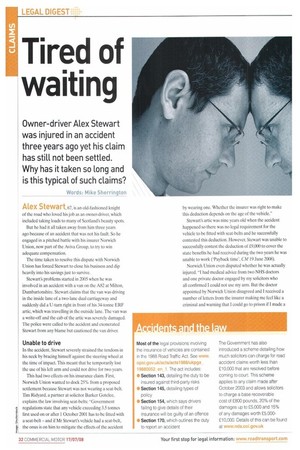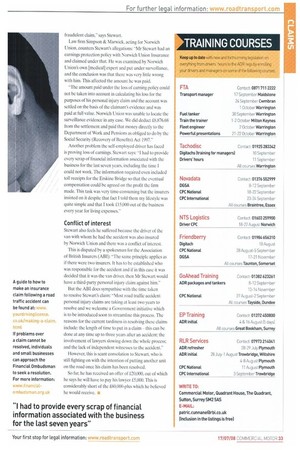Tired of waiting
Page 32

Page 33

If you've noticed an error in this article please click here to report it so we can fix it.
Owner-driver Alex Stewart was injured in an accident three years ago yet his claim has still not been settled. Why has it taken so long and is this typical of such claims?
Words: Mike Sherrington
Atex ttewart, 67, is an old-fashioned knight of the road who loved his job as an owner-driver, which included taking loads to many of Scotland's beauty spots.
But he had it all taken away from him three years ago because of an accident that was not his fault. So he engaged in a pitched battle with his insurer Norwich Union, now part of the Aviva Group, to try to win adequate compensation.
The time taken to resolve this dispute with Norwich Union has forced Stewart to close his business and dip heavily into his savings just to survive.
Stewart's problems started in 2005 when he was involved in an accident with a van on the A82 at Milton, Dumbartonshire. Stewart claims that the van was driving in the inside lane of a two-lane dual carriageway and suddenly did a U-turn right in front of his 34-tonne ERF artic, which was travelling in the outside lane. The van was a write-off and the cab of the artic was severely damaged. The police were called to the accident and exonerated Stewart from any blame but cautioned the van driver.
Unable to drive
In the accident, Stewart severely strained the tendons in his neck by bracing himself against the steering wheel at the time of impact. This meant that he temporarily lost the use of his left arm and could not drive for two years.
This had two effects on his insurance claim. First, Norwich Union wanted to dock 25% from a proposed settlement because Stewart was not wearing a seat-belt. Tim Ridyard, a partner at solicitor Barker Gotelee, explains the law involving seat-belts: "Government regulations state that any vehicle exceeding 3.5 tonnes first used on or after 1 October 2001 has to be fitted with a seat-belt — and if Mr Stewart's vehicle had a seat-belt, the onus is on him to mitigate the effects of the accident by wearing one. Whether the insurer was right to make this deduction depends on the age of the vehicle."
Stewart's artic was nine years old when the accident happened so there was no legal requirement for the vehicle to be fitted with seat-belts and he successfully contested this deduction. However, Stewart was unable to successfully contest the deduction of £9,000 to cover the state benefits he had received during the two years he was unable to work (Payback time', CM 19 June 2008).
Norwich Union even disputed whether he was actually injured. "I had medical advice from two NHS doctors and one private doctor engaged by my solicitors who all confirmed I could not use my arm. But the doctor appointed by Norwich Union disagreed and I received a number of letters from the insurer making me feel like a criminal and warning that I could go to prison if I made a
fraudulent claim," says Stewart.
Law firm Simpson & Marwick, acting for Norwich Union, counters Stewart's allegations: "Mr Stewart had an earnings protection policy with Norwich Union Insurance and claimed under that. He was examined by Norwich Union's own [medical] expert and put under surveillance, and the conclusion was that there was very little wrong with him. This affected the amount he was paid.
"The amount paid under the loss of earning policy could not be taken into account in calculating his loss for the purposes of his personal injury claim and the account was settled on the basis of the claimant's evidence and was paid at full value. Norwich Union was unable to locate the surveillance evidence in any case. We did deduct £8.876.68 from the settlement and paid that money directly to the Department of Work and Pensions as obliged to do by the Social Security (Recovery of Benefits) Act 1997."
Another problem the self-employed driver has faced is proving loss of earnings. Stewart says: "I had to provide every scrap of financial information associated with the business for the last seven years, including the time I could not work. The information required even included toll receipts for the Erskine Bridge so that the eventual compensation could be agreed on the profit the firm made. This task was very time-consuming but the insurers insisted on it despite that fact I told them my lifestyle was quite simple and that I took .£15,000 out of the business every year for living expenses.
Conflict of interest
Stewart also feels he suffered because the driver of the van with whom he had the accident was also insured by Norwich Union and there was a conflict of interest.
This is disputed by a spokesman for the Association of British Insurers (ABI): "The same principle applies as if there were two insurers. It has to be established who was responsible for the accident and if in this case it was decided that it was the van driver, then Mr Stewart would have a third-party personal injury claim against him."
But the ABI does sympathise with the time taken to resolve Stewart's claim: "Most road traffic accident personal injury claims are taking at least two years to resolve and we welcome a Government initiative which is to be introduced soon to streamline this process. The reasons for the current tardiness in resolving these claims include: the length of time to put in a claim — this can be done at any time up to three years after an accident; the involvement of lawyers slowing down the whole process; and the lack of independent witnesses to the accident."
However, this is scant consolation to Stewart, who is still fighting on with the intention of putting another unit on the road once his claim has been resolved.
So far, he has received an offer of 120,000, out of which he says he will have to pay his lawyer £5,000. This is considerably short of the I60,000-plus which he believed he would receive. •












































































































































































